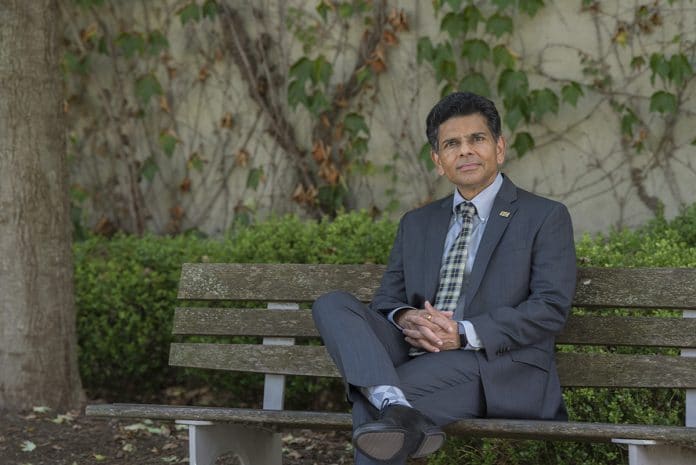Your donation will support the student journalists of Northern Kentucky University. Your contribution will allow us to purchase equipment and cover our annual website hosting costs.
Photo provided | Northern Kentucky University
NKU President Ashish Vaidya.
Outgoing NKU President Ashish Vaidya to receive $1.3 million
November 23, 2022
Outgoing Northern Kentucky University President Ashish Vaidya will receive $1.3 million in compensation after he and the university decided to mutually terminate his contract.
This amount is about two times Vaidya’s base salary of $450,000 per year and then adds around 30% to reflect benefits, according to Board of Regents Chair Rich Boehne, elaborating that Vaidya’s salary and separation agreement are pretty typical for university presidents.
Vaidya will receive roughly half the amount he would have received if he had served the remainder of his contract that was set to expire in 2027. Had he stayed employed with NKU throughout his contract, he would have received $2,700,000 in total compensation during that time.
The announcement that Vaidya and the university are parting ways came last Thursday during a special Board of Regents meeting.
Boehne said at the meeting that Vaidya and the university mutually agreed upon the president’s departure, which is effective Dec. 19, 2022.
Vaidya will receive part of the separation payment on or before Dec. 2, with the rest of the money coming on or before Jan. 31, 2023. He is also set to receive $28,385 for accrued paid time off.
Vaidya’s office didn’t respond to a request for comment in time for this article’s publication.
In his employment contract with the university, which was renewed in December of 2021, Vaidya received a base salary of $450,000. Under that agreement, the Board of Regents could have increased his salary each year, but they could not have decreased it.
In comparison, University of Cincinnati President Neville Pinto made $660,000 as a base salary in 2021. In 2020, Eastern Kentucky University — which is similar in size to NKU — hired Dr. David McFaddin with a salary of $300,000 per year. In 2021, Western Kentucky University approved a contract to increase President Timothy Caboni’s base pay to $450,000 per year.
The university also offered Vaidya a yearly performance bonus of $50,000 based on performance metrics determined by the Board of Regents.
The president also received a housing allowance of $5,863 a month or $70,356 per year.
The original employment contract also states that the university could terminate Vaidya’s contract under several circumstances, but in his separation agreement, both the university and the president agreed to part ways in this amicable manner.
These types of employment and separation contracts are common for high-level executive employees and university presidents, according to Kelly Myers, an attorney specializing in labor and employment law at Freking, Myers, and Reul.
“When a university or any employer has to fill a high-level position that may require a national search of highly competitive positions, employment contracts are often a way to recruit and obtain high-level candidates,” Myers said.
It is also not uncommon for universities and high-level executives to make a separate agreement after reaching agreeable terms to move in different directions, Myers said.
While the employment agreement is executed at the beginning of employment and contains termination clauses, these clauses weren’t triggered in this case. Instead, NKU and Vaidya reached an entirely separate agreement.
“They reached an agreement and decided they were going to go in a different direction or part ways,” Myers said.
Vaidya also agreed not to sue the university as part of the separation agreement.
Boehne told LINK nky last week that the university and Vaidya aren’t parting ways because of the university’s recent budget troubles.
“Just really more focused on what the university needs to look like over the next three, five, seven, eight, nine years,” Boehne said.
When asked why the university and Vaidya decided to part ways now, Boehne said it was as good of a time as any.
“I think we saw it differently: two sides had come to that conclusion, the board and the president, then, at the end of the semester, it was probably a very logical time to do it,” Boehne said, elaborating that at any time they would make this decision they would be scrambling to find an interim president.
The announcement regarding Vaidya comes on the heels of an October report showing the university faced a budget deficit of $18.7 million, which has since increased to $24.2 million.
“Sure, it’s a concern,” Boehne said about spending this amount for Vaidya’s separation agreement. “…anything you’re loading into the budget, you’re being very thoughtful about.”
According to reporting from NKU’s student newspaper, The Northerner, the university’s gross tuition and fees revenue fell by 2.3% from $168.5 million in 2021 to $164.6 million this year, while expenses rose from $276.7 million to $290.2 million, representing a 4.9% change.
The Northerner also reported that NKU’s Chief Financial Officer, Jeremy Alltop, is pursuing another job. Alltop started the position in July but was unaware of the budget deficit.
Here are the additional benefits of Vaidya’s original employment contract, but not part of his separation agreement:
-Automobile: The university provided Vaidya with an automobile during his tenure as president.
-Cell phone: NKU also provided Vaidya with a cellphone
-Vacation: The president received five weeks of vacation and 12 sick days.
-Health insurance: The university covered Vaidya’s health insurance.
-Life insurance: His life insurance policy equaled a year of his salary of $450,000.
-Retirement: The university offers a TIAA/CREF Retirement Plan and contributes 10% of Vaidya’s salary, with Vaidya required to add 5%. (He can make max contributions in 2022 and 2023).
-Split Dollar Capital Accumulation Plan: The university funded this plan with $100,000 during Vaidya’s tenure at the university.
-Business expenses: The university covered Vaidya’s necessary expenses to perform his job.
-Club memberships: The university paid for memberships to the Metropolitan Club and/or The Queen City Club.
*Editor’s note: This story originally appeared in LINKnky.com. To view the original story, click here.

